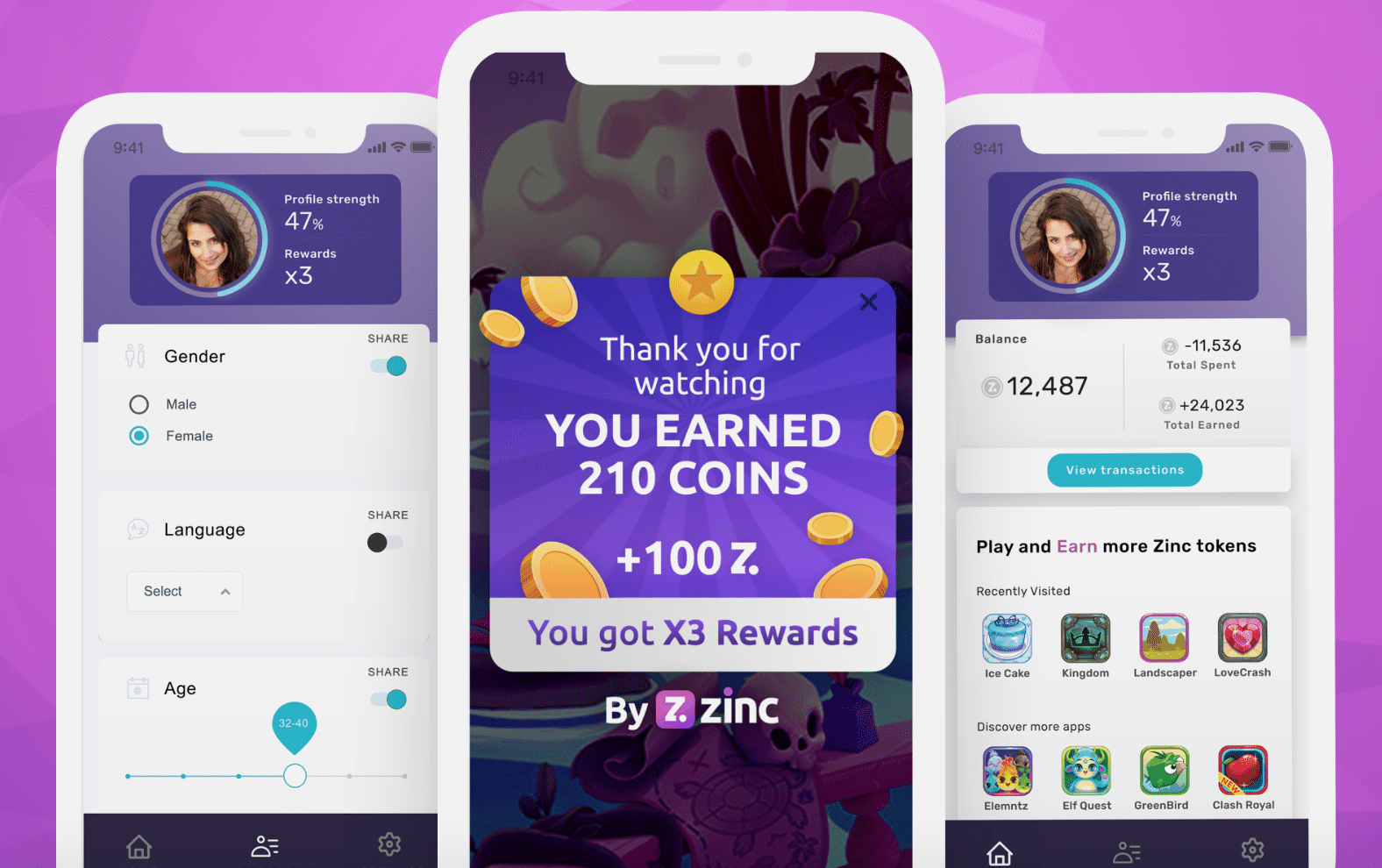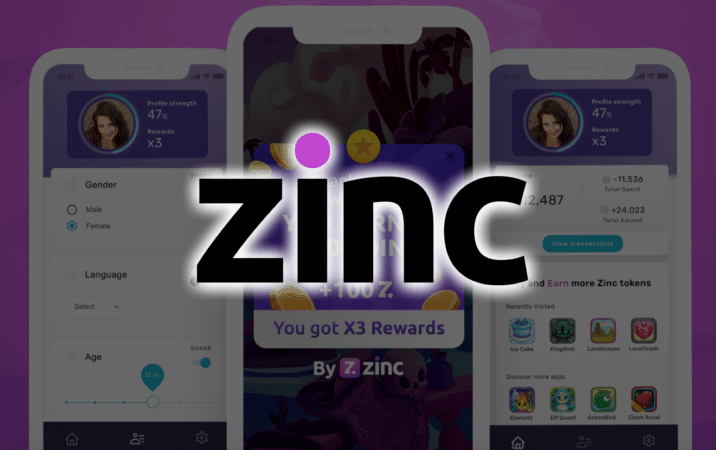Over 30% of the $335 billion projected ad spend in 2020 is estimated to be lost to inefficiencies in the current digital advertising landscape.
With nearly a third of all money that goes into digital advertising getting thrown into the abyss of click farms, click spam, malware, ad stacking, bots, and other wasteful activity, it’s no surprise dozens of entrepreneurs in the space are turning to build businesses around solutions.
Zinc is a blockchain-based advertising protocol looking to crack the code to salvage some of the estimated $100.5 billion that goes to waste.
Zinc incentivizes users to be more engaged with the platform by compensating them with rewards for the ads they watch in the apps they already use. These rewards can be spent to reduce the number of ads they see, as well as accessing premium features and content inside Zinc Protocol partner apps.
Daniel Trachtemberg, the CEO and Founder of Zinc, was previously the Head of Mobile Fraud Prevention and Director of the Mobile Data Management Platform at app monetization company ironSource with over 1.5 billion monthly active users.
How does Zinc differentiate from other similar projects targeting blockchain in advertising, such as Basic Attention Token?
One of the main challenges for all new startups, especially in decentralized ecosystems like blockchain based dApps is distribution: user acquisition & adoption.
BAT is aiming to drive adoption through their web browser – the “Brave” browser. A great product, but getting the users to adopt a new browser and change their habits on that level is quite a challenge. So one key difference is that users who will participate in the Zinc protocol ecosystem will gain more rewards within the apps they already use. Basically, apart from having to install the Zinc wallet app, where users choose what information to share with advertisers, they continue doing everything as they do now, and so does the rest of the industry.
Another key difference between Zinc and other projects is that the Zinc Protocol does not aim to cut out the middleman. A lot of projects are claiming that the problem is the middlemen and if advertisers and publishers had a way to work together those problems would be solved, which in concept is a great idea, but in practice we think it’s a bit naive.
It seems that Zinc is focusing efforts into app-based advertising rather than website advertising. Is site-based advertising something Zinc will explore in the future or do you see the future of digital advertising as being app-based?
Web-based advertising is something Zinc will definitely explore in the future. However, it seems the general trend is towards mobile: more and more people spend more time on their mobile phones. Mobile is a segment that’s showing rapid growth and advertisers see the potential, which is evident when you look at the growth of marketing budget spend on mobile each year.
But this growth also fuels inefficiencies and fraud, keeping big brand advertisers away from running mobile campaigns, which, in my opinion, is quite a paradox: as fraud grows in relation to mobile spend growth. So if we eliminate fraud & data inefficiencies, mobile can become even a greater untapped channel – especially for brand advertisers with big budgets.
In addition to fraud, access to quality data is one of the issues faced by advertisers. Can you explain why this is an issue, and how Zinc will provide better data quality to advertisers?
First party, real human-verifiable user data is the most precious asset traded in the advertising ecosystem, I would dare to say even more than actual ad real estate.
Most advertising budgets are dedicated to targeting specific audiences. So if a publisher succeeds in attaching high quality, verifiable user data when selling an ad space, the amount of money he’ll be able to charge is exponentially higher than without this user data – this is key to understanding how Zinc will generate value for all the players in the ecosystem, including the user/consumer.
Today only Facebook and Google and some PMPs (private marketplaces) have this kind of data. Imagine that you could target users outside the duopoly with the same accuracy – it will improve the way app developers and publishers do business (focusing of ad quality and not quantity): increase the advertiser’s capability to generate reach, and significantly improve the user experience.
That’s exactly what the Zinc protocol is meant for: ensuring users are real humans, allowing users to self-disclose basic information in exchange or getting more rewards and fewer ads via the Zinc token ecosystem. This first party data information will be used to target the specific audiences with a higher accuracy and efficiency resulting in higher revenue, less waste and better user experience.
Many app-based games such as Angry Birds already offer users the ability to earn and spend in-game rewards. How will the user experience with Zinc differ from this?
Most of the game publishers rely on advertising to achieve two main goals: the first, monetize and build their businesses; the second, keep players engaged in the game by offering them in-game rewards. This is the basic tradeoff in the free-to-play economy: the users watch ads and in return get rewarded with coins, lives, time, etc. This process today is very inefficient due to fraud, lack of reliable user data, lack of user identification, lack of transparency, etc.
Zinc protocol will improve this process significantly by reducing fraud, providing first-party user data, and increasing transparency. The Zinc protocol will continue to support the free-to-play economy, without the excessive amount of ineffective advertising.
Today, if a publisher needs to push ten ads per session to support his app and have a positive ROI, with Zinc Protocol, probably two or three ads will be enough. All this while continuing to use the same in-game currency and rewards.

The rewards are one part, the consent is another.
Rewards improve the experience, keeping users motivated and actively engaged in their online experiences.
Consent is the highest level of user permission a user can give to allow the use of his data. Consent implies knowledge & understanding – if you do not know, how you can give consent?
This is the exact point that sets apart regulation (such as the GDPR) from real life: users need to actively care and make time to explore the data that the advertising ecosystem uses to follow, target & analyze them – which is complex and difficult, and all they get in return is supposedly better ads, which they want to ignore anyways, so how is this supposed to work?
The Zinc Protocol proposes to give the user:
- Transparency, ownership and control of his data – whenever the user wants to look into the information that is being used or stored about him he will have access without the need for permission. The user will be able to delete or detach the data from his digital profile.
- Streamlined user experience: linking the benefits (like increased rewards) users get for sharing their data, incentivising users to provide an opt-in consent to use their data in a way that is very intuitive to understand.
In the Zinc Protocol ecosystem compliance is enabled by decentralization (users are the only ones who can determine who has access to what part of their information), it will relieve publishers and app developers from the responsibility of managing the user data, while providing the advertisers with first party, high quality data that the users themselves chose to share, so they don’t have to worry about regulation changes such as being GDPR compliant.
Zinc will be paid out as rewards for users, but also potentially as revenues to app publishers. How does Zinc plan to ensure that the token retains value outside of the ecosystem for publishers, or anyone else who wants to exchange ZINC for fiat?
Zinc tokens are intended to support the ecosystem’s ‘attention-economy’ and make the token inherently valuable. Its exchange drives the transactional economy between publishers and app developers, advertisers, users, and ad networks.
As long as the transaction of attention is at the heart of th advertising ecosystem, the Zinc token will remain valuable, as it will allow the exchange of attention-per-experience in a way that wasn’t even possible before
The value of the Zinc token will be determined by the number of users who join the ecosystem and store Zinc tokens on their wallets and the number of partners (publishers, advertis, rs and ad-networks) that are part of the ecosystem + the amount of transactions that are made using Zinc tokens.
We work to ensure that all of this parameters will increase in time at a steady growth rate by setting up quality partnerships with leading adtech players.
How does Zinc plan to attract new users, publishers and advertisers/networks to the platform?
The initial user acquisition for the Zinc Wallet App will be done via Rewarded Video ads, one of the most effective formats in mobile advertising, where users can watch an ad and get some form of in-app reward, usually in the form of another chance at playing the game. This type of campaigns is something that our team is experienced in, and something that makes sense as the audience we’ll be targeting through this channel is highly engaged users, accustomed to being rewarded for viewing ads – who will want to maximize the in-app perks they get.
As for adoption by business partners on both the supply and demand side, we believe they have a business interest to join the Zinc ecosystem to improve the way they operate:
Allowing publishers & developers to monetize effectively; allowing them also to comply with data privacy regulations such as GDPR; allowing Advertisers to audit and verify the validity of their audiences and make their ad spend more effective.
We have a few strategies for onboarding partners: from referral programs to advisory groups, direct brand partnerships and partnerships with mediation platforms. We feel everyone has a potential to benefit from joining the Zinc Protocol ecosystem, with very little effort on their side with the hurdles of adoption of a new technology.
You and your team have a strong background in the ad-tech industry. How did you come to the idea of applying blockchain to the digital advertising sector, and why blockchain?
Being a mobile gamer, I suffer from ad-overload just as much as an app user. On a professional level, I was always passionate about the idea of users taking a more active role in the advertising game and had a few ideas on how to do that in a way that will also help mitigate some of the most painful problems in the ecosystem.
About two years ago I started researching blockchain technology and realized it has the potential to provide a technological solution to several of the unsolved issues – creating transparency and credibility across non-related partners in a way that was almost impossible before, allowing users to control their data, providing an accessible mechanism of value exchange, etc.
So, slowly but surely, I started developing the concept of Zinc together with a team of passionate enthusiasts, based on the understanding that creating a decentralized governance using blockchain technology and a custom token will allow any partner in the ecosystem to work using the same protocol while preserving business independence, allowing players to add capabilities such as reward mechanisms on the publisher side, and verifiable audiences on the advertiser’s, providing them with new ways to increase transparency and improve monetization.
What are the next steps for Zinc moving towards the ICO?
We all know the market is down and going through an important transition phase that will take some time to define, I see it as part of the maturity process of the field.
But the Zinc team is dedicated and is continuing to build the protocol and develop the Wallet App to make sure we keep up with our development goals and roadmap. Also, we are investing efforts in engaging with worldwide potential partners that will be announced soon, both from the online and mobile advertising ecosystem and from the crypto community.
Over the past month, we’ve received several inquiries from financial companies and people asking if our private token sale was still on – the answer is yes! We are currently on the private pre-sale of the Zinc tokens.
Thank you!
Never Miss Another Opportunity! Get hand selected news & info from our Crypto Experts so you can make educated, informed decisions that directly affect your crypto profits. Subscribe to CoinCentral free newsletter now.










